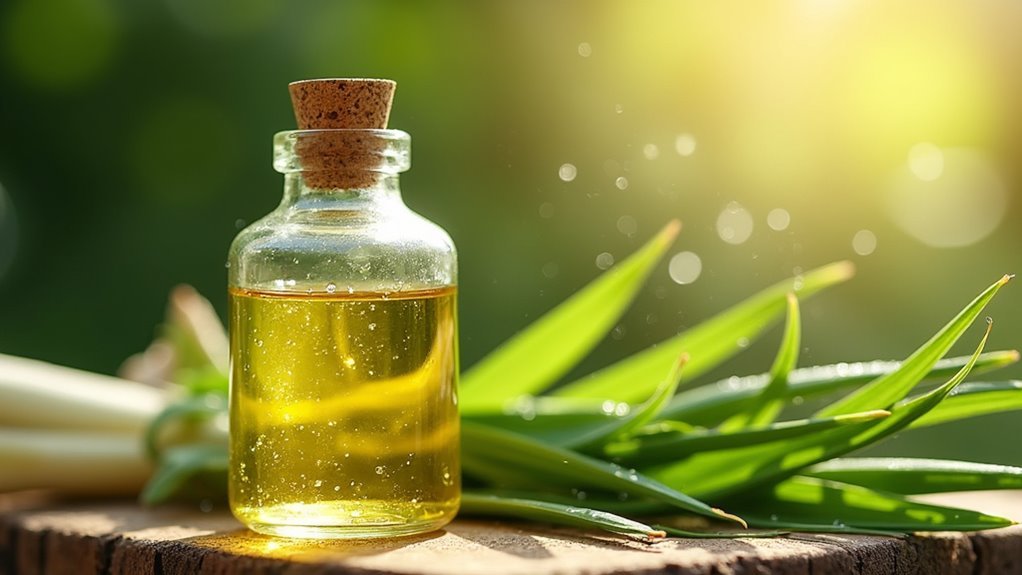You can effectively repel insects using citrus essential oils like lemon eucalyptus, bergamot, and lemongrass, which disrupt bugs’ sensory receptors while creating pleasant aromas. Lemon eucalyptus oil provides up to three hours of DEET-level protection, while lemongrass offers 95% bite protection through its high citronella content. Always dilute these oils with carriers before applying to skin and avoid sun exposure due to phototoxic properties. Discover proven recipes and application techniques that’ll maximize your natural pest control success.
Why Citrus Essential Oils Effectively Repel Insects

When mosquitoes and other pests invade your outdoor space, citrus essential oils offer a powerful natural defense by disrupting insects’ sensory receptors. These natural insect repellents contain compounds that confuse and deter bugs from targeting you.
Lemon eucalyptus oil stands out as particularly effective against mosquitoes, providing up to three hours of protection comparable to synthetic alternatives.
The insect-repellent properties of citrus oils like citronella and bergamot make them excellent essential oil insect repellent options.
You’ll appreciate their dual benefits: they ward off unwanted pests while delivering a revitalizing fresh scent that enhances your mood.
Unlike harsh chemical repellents, citrus oils create a pleasant atmosphere while maintaining their protective qualities, making them ideal for both indoor and outdoor applications where you want effective bug protection without compromising comfort.
Top Citrus Essential Oils for Natural Pest Control
You’ll find Lemon Eucalyptus oil stands out as the most effective citrus repellent, with its PMD compound providing DEET-level protection for up to three hours.
Bergamot oil offers dual benefits by repelling insects while also treating existing bites and stings with its mood-boosting citrus properties.
Understanding proper application methods becomes essential since many citrus oils are phototoxic and can irritate your skin when exposed to sunlight.
Lemon Eucalyptus Effectiveness
Lemon eucalyptus essential oil stands out as one of nature’s most powerful insect repellents, containing PMD (p-menthane-3,8-diol) that delivers mosquito protection rivaling DEET’s effectiveness for up to three hours.
You’ll find this oil effective in repelling mosquitoes and other biting insects, making it a versatile pest control solution. When you apply essential oils topically, dilute lemon eucalyptus with a carrier oil for safe skin application.
Unlike synthetic alternatives, you can use this natural insect repellent around children and pets when properly diluted. The pleasant citrus scent makes it more appealing than chemical repellents.
Studies confirm its broad-spectrum effectiveness against various biting insects, providing reliable protection while maintaining an eco-friendly approach to pest control.
Bergamot Bug Repelling
Bergamot essential oil brings dual benefits to your natural pest control arsenal, combining effective insect repelling properties with a delightful citrus fragrance that transforms bug protection into an aromatic experience.
You’ll find bergamot oil particularly valuable when treating existing insect bites, as its soothing properties provide immediate relief from irritation and discomfort.
When creating your own insect repellent, blend bergamot essential oil with carrier oils to develop a gentle formula perfect for sensitive skin. This combination guarantees effective natural pest control without harsh chemicals.
However, remember that bergamot oil is phototoxic, so you shouldn’t apply it before sun exposure. Mix it with other essential oils to enhance your repellent’s scent profile while maintaining its bug-fighting effectiveness for thorough protection.
Citrus Application Methods
When applying citrus essential oils for bug repellent, you’ll need to choose the right method based on your specific situation and safety considerations.
These powerful mosquito repellent oils must be diluted properly to prevent skin irritation while maintaining effectiveness.
Here are four effective application methods for citrus oils:
- Topical Application – Mix citrus oils with carrier oils like coconut or jojoba oil before applying to skin.
- DIY Insect Repellent Spray – Combine diluted oils with water and witch hazel in a spray bottle.
- Diffuser Method – Use in essential oil diffusers to create protective barriers indoors.
- Fabric Treatment – Spray diluted solution on clothing and outdoor gear.
Remember to reapply frequently since citrus oils evaporate quickly.
Always avoid sun exposure after topical application due to phototoxic properties.
Lemon Essential Oil: Your First Line of Defense
Though many natural repellents exist, lemon essential oil stands out as one of the most potent defenses against buzzing invaders.
You’ll find this natural insect repellent particularly effective against mosquitoes and flies, thanks to its strong citrus compounds that mask your body’s attractive scents. When you apply lemon essential oil as a spray or topical treatment, you can expect up to three hours of protection.
However, you must exercise caution due to its phototoxic properties. Avoid direct sunlight after application to prevent skin irritation.
For enhanced effectiveness, you can combine lemon oil with eucalyptus or lavender oils. This natural approach gives you powerful protection while avoiding harsh chemical alternatives that many commercial repellents contain.
Lemongrass Oil for Mosquito and Fly Protection

You’ll find lemongrass oil stands out as one of the most effective natural mosquito and fly repellents, offering up to 95% protection against bites thanks to its high citronella content.
The oil’s fresh citrus scent doesn’t just drive insects away – it creates a pleasant outdoor atmosphere while you enjoy bug-free activities.
Whether you’re making DIY repellent blends or applying diluted solutions directly to your skin, lemongrass oil provides multiple application methods to suit your specific needs.
Mosquito Repellent Properties
While synthetic repellents dominate store shelves, lemongrass oil offers a powerful natural alternative that’s proven effective against mosquitoes and flies. This essential oil contains citral, giving it powerful mosquito-repelling properties that’ll keep insects at bay for up to two hours.
Here’s what makes lemongrass oil an excellent choice:
- Safe application – When diluted with a carrier oil, you can apply it directly to your skin without harsh chemicals.
- Pleasant scent – Its fresh citrus aroma enhances your outdoor experience while deterring bugs.
- Versatile use – Create DIY insect repellent sprays by combining with other essential oils.
- Broad effectiveness – Successfully repels various mosquito species and flies.
You’ll find lemongrass oil particularly effective for outdoor activities, providing natural protection that doesn’t compromise your health or comfort while helping you repel insects naturally.
Application Methods Guide
Several application methods can maximize lemongrass oil’s mosquito and fly repelling effectiveness while ensuring your safety.
First, you’ll need to dilute this essential oil properly before skin contact. Mix 10 drops of lemongrass oil with 2 tablespoons of carrier oil like sweet almond oil, then apply directly to exposed areas.
For broader coverage, create a homemade spray by combining lemongrass oil with distilled water and carrier oil in a spray bottle. This repellent works effectively around outdoor spaces where insects gather.
Remember to reapply regularly, especially in humid conditions or after water exposure, as the oil’s effectiveness diminishes over time.
Importantly, avoid sun exposure immediately after application since citrus oils can cause skin irritation when exposed to sunlight.
Bergamot Essential Oil Benefits and Precautions
Since bergamot essential oil comes from the rind of Citrus aurantium var. Bergamia, it’s an effective way to repel insects while providing mood-boosting benefits.
You’ll appreciate its anti-inflammatory properties that treat insect bites and reduce skin irritation.
Here are key benefits and precautions:
- Natural repellent – Add to homemade sprays for invigorating insect protection
- Bite treatment – Apply diluted oil to soothe existing insect bites
- Phototoxic warning – Avoid sun exposure after topical application to prevent skin sensitivity
- Green cleaning – Include in cleaning solutions for pleasant aroma and bug deterrent effects
You should take precautions with bergamot essential oil, especially if you have sensitive skin or allergies.
It’s wise to consult a healthcare professional before use to guarantee safe application.
Creating DIY Citrus Bug Repellent Sprays

Although store-bought repellents work effectively, you’ll find that creating your own citrus bug repellent sprays offers better control over ingredients while saving money.
Start with 10 drops of lemon eucalyptus oil combined with 2 tablespoons of carrier oil like coconut or sweet almond oil for effective protection against mosquitoes.
Mix 10 drops lemon eucalyptus oil with 2 tablespoons carrier oil for natural mosquito protection that actually works.
For a spray version, mix 2 oz distilled water, 1 oz witch hazel or vodka, and 40-70 drops of citrus oils in a spray bottle.
Always shake your repellent spray well before use since oils and water naturally separate.
Before applying your homemade mixture, perform a patch test on a small skin area to guarantee you won’t experience adverse reactions to the concentrated oils.
Safe Application Methods for Citrus Essential Oils
When applying citrus essential oils to your skin, you must dilute them properly with a carrier oil to prevent irritation and potential chemical burns.
Before any topical application, always dilute essential oils and perform a patch test on a small skin area to check for adverse reactions.
Follow these safe application guidelines when you use essential oils for your homemade insect repellent:
- Mix properly – Combine 40-70 drops of citrus oil with 2 oz water and 1 oz carrier oil
- Test first – Apply diluted mixture to your inner wrist and wait 24 hours
- Avoid sun exposure – Don’t apply before going outdoors due to phototoxic properties
- Consider diffusing – Use a diffuser indoors to repel insects without direct skin contact
Combining Citrus Oils With Other Natural Repellents
Building on proper dilution and application techniques, you can markedly boost your citrus oil repellent’s effectiveness by combining it with other natural bug-fighting ingredients.
Blend citrus oils like lemon eucalyptus with lavender and peppermint to target broader insect ranges. You’ll create more powerful natural repellents by adding thyme and rosemary, which provide antimicrobial benefits alongside pest control.
Combining citrus oils with lavender, peppermint, thyme, and rosemary creates broader-spectrum natural repellents with added antimicrobial protection.
Always mix your essential oils with carrier oils like coconut or jojoba to prevent skin irritation while maintaining potency. Since citrus oils are phototoxic, this dilution becomes essential for sun-exposed areas.
These combinations not only enhance your insect repellents’ effectiveness but also create pleasant, uplifting scents that make outdoor time more enjoyable while keeping mosquitoes and flies away.
Storage and Maintenance of Citrus-Based Repellents
Proper storage will determine whether your citrus-based repellents maintain their bug-fighting power or lose effectiveness within weeks.
Follow these essential storage guidelines to maximize your citrus essential oils’ ability to repel insects:
- Use dark glass containers – Store lemon and lemongrass oils in dark bottles to shield them from light exposure and extend shelf life.
- Keep away from heat – Avoid storing near heat sources or direct sunlight, as high temperatures degrade potency.
- Check for spoilage – Regularly inspect oils for changes in scent or consistency indicating oxidation.
- Seal containers tightly – Minimize air exposure by ensuring bottles are tightly sealed when not in use.
Use your citrus-based repellents within 6-12 months after opening for best effectiveness against bugs.
Frequently Asked Questions
Does Citrus Essential Oil Repel Bugs?
Yes, you’ll find citrus essential oils effectively repel bugs. Lemon eucalyptus and lemongrass contain natural compounds that deter mosquitoes for hours. You can create DIY repellents, though be cautious of potential sun sensitivity.
What Essential Oil Keeps Most Bugs Away?
You’ll find lemon eucalyptus oil keeps most bugs away effectively. Its active compound PMD repels mosquitoes for three hours, it’s safe around children and pets, and works against various insects better than other options.
What Bugs Does Citrus Repel?
You’ll find citrus oils effectively repel mosquitoes, fleas, gnats, flies, and other flying insects. Lemon eucalyptus works against mosquitoes, while citronella deters fleas. Lemon and lemongrass target gnats, and bergamot repels flies.
How Do You Make Citrus Bug Repellent?
You’ll mix 10 drops of citrus essential oil like lemon eucalyptus or citronella with 2 tablespoons of carrier oil. For spray versions, combine citrus oils with distilled water and witch hazel.
In Summary
You’ve discovered how citrus essential oils can naturally protect your home from unwanted pests. By choosing the right oils like lemon, lemongrass, or bergamot, you’ll create effective DIY repellents that won’t harm your family or environment. Remember to dilute properly, store correctly, and combine oils for maximum effectiveness. Start experimenting with these natural alternatives today—you’ll enjoy bug-free spaces while avoiding harsh chemical pesticides that damage your health and surroundings.





Leave a Reply